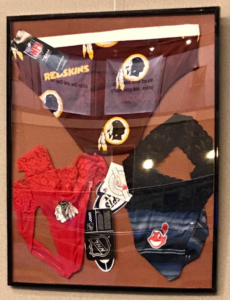“What initial or lingering emotions are you feeling? Do these images offend you?”
These are the questions posed by a sign at the “Racism, Sexism and Stereotypes” exhibit in the student center of my school, Xavier University. Sponsored by Xavier’s Center for Diversity and Inclusion (CDI), the exhibit is intended to “spark conversation that will lead to greater understanding, accountability, and social change.”
 Among the artifacts on display is a collection of women’s underwear branded with Washington Redskins, Chicago Blackhawks, and Cleveland Indians logos. This may, according to the exhibit’s description, cause unintended harm to viewers, but can provide windows that allow us to see more clearly how history influences today’s social issues.
Among the artifacts on display is a collection of women’s underwear branded with Washington Redskins, Chicago Blackhawks, and Cleveland Indians logos. This may, according to the exhibit’s description, cause unintended harm to viewers, but can provide windows that allow us to see more clearly how history influences today’s social issues.
Initially, this might make us feel cozy and socially responsible. But in reality, the exhibit accomplishes nothing except for diverting our attention away from the real injustices that afflict our community.
The city of Cincinnati ranks 3rd nationally in terms of child poverty behind Cleveland and Detroit. Nearly 90,000 children in the tristate area are food insecure, meaning they often do not know where their next meal is coming from, or if they will get a meal at all. Each Friday, over 5,000 students rely on packs of food called Power Packs to ensure they have something to eat over the weekend. Many go to bed hungry.
The mission of Xavier’s CDI is to “achieve a unifying consciousness for the common good.” It has done the opposite. “Microagressions” and “triggers” now irritate us more than hunger or poverty, and our campus leaders are complicit in this embarrassing rearrangement of priorities. Their continual fabrication of controversy proliferates a plague of hypersensitivity that has crippled our capacity to take action on pressing issues.
There are plenty of things to be outraged about in this world. Hunger is one of them. Underwear is not. Blithely overlooking the plight of our neighbors while encouraging students to share their emotions about team-branded panties is a blatant waste of time and energy.
In the past, anger and frustration fueled some of society’s most admirable revolutions and progressions. But today, how much of that anger and frustration is squandered on policing political correctness and coddling feelings? Does magnifying something that people wouldn’t typically care about compromise our ability to mobilize assistance for children, some of which are in walking distance from Xavier, who might go to bed hungry tonight?
The CDI has good intentions, as do most of us. We understand right from wrong. This isn’t a matter of morality. It’s a matter of convenience. Indulging in pseudo-drama boils down to one thing: it’s easy. It’s easy to talk about the world as we’d like it to be instead of how it actually is. It’s easy to retreat into a fantasy world where hard and unpleasant facts don’t interfere with our comfort. But the longer we stew over insubstantial issues, the faster the community around us unravels.
If the CID truly wants to work for the common good, it should line the walls of the student center with pictures of the 90,000 local children that have probably never heard of a bias incident, but know the pain of hunger all too well.
Dominic’s articles, essays, interviews, and book recommendations are sent in his monthly newsletter. All subscribers receive the PDF “11 Immutable Writing Lessons from Legendary Authors.”